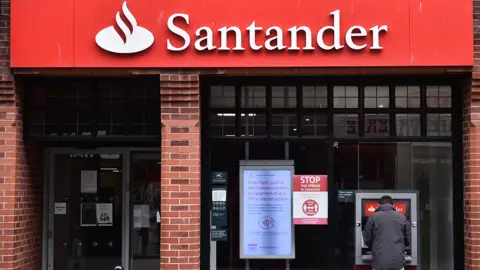Santander UK fined £108m over money laundering failings
 Getty Images
Getty ImagesSantander has been fined £107.7m over "serious and persistent gaps" in its anti-money laundering controls which opened the door to "financial crime".
The financial watchdog said the bank "failed to properly oversee and manage" systems aimed at verifying information provided by business customers.
Santander also failed to properly monitor the money customers had going through their accounts.
The bank said it was "very sorry" for the failings and had taken action.
Mark Steward, executive director of enforcement and market oversight at the Financial Conduct Authority (FCA), said: "Santander's poor management of their anti-money laundering systems and their inadequate attempts to address the problems created a prolonged and severe risk of money laundering and financial crime.
The failings affected the oversight of accounts held by more than 560,000 business customers between 31 December 2012 and 18 October 2017, and led to more than £298m passing through the bank before it closed accounts.
The FCA said that in one case, a new customer opened an account as a small translations business with expected monthly deposits of £5,000. Within six months it was receiving millions in deposits, and swiftly transferring the money to separate accounts.
Although the account was recommended for closure by the bank's own anti-money laundering team in March 2014, the FCA said that poor processes by Santander meant that it was not acted upon until September 2015.
As a result, the customer continued to receive and transfer millions of pounds through its account.
The City watchdog identified several other business banking accounts which Santander failed to manage correctly, leaving the bank open to "serious money laundering risk".
Santander chief executive Mike Regnier said: "We are very sorry for the historical anti-money laundering related controls issues in our Business Banking division between 2012-17 highlighted in the FCA's findings."
He said the bank took action to address the issues once they were identified, but accepted that its anti-money laundering controls at the time should have been stronger.
"We have since made significant changes to address this by overhauling our financial crime technology, systems and processes, he said, adding that more than 4,400 Santander staff are now focused on preventing financial crime.
Regulators have been busy cracking down on banks for money-laundering failures.
The biggest UK fine was for NatWest, which was penalised £265m in December 2021 after it admitted three offences of failing to comply with money laundering regulations between 2012 and 2016. It failed to prevent money-laundering of nearly £400m by a Bradford gold trading business, which in one instance deposited £700,000 in cash into a branch in black bin bags.
HSBC was also fined in December 2021, paying £64m after the FCA found "unacceptable failings" in its anti-money laundering systems between 2010 to 2018. The bank had previously been fined £1.4bn for failing to prevent laundering by Mexican drug cartels after an investigation by the US Department of Justice.
In June this year, Credit Suisse was fined for involvement in money laundering related to a Bulgarian drugs ring. It was fined around £1.7m and ordered to pay £15m to the Swiss government.

If you have information about any of the issues raised in this story and would like to speak to a BBC journalist, please email [email protected].
You can also get in touch in the following ways:
- WhatsApp: +44 7756 165803
- Tweet: @BBC_HaveYourSay
- Upload pictures or video
- Please read our terms & conditions and privacy policy
If you are reading this page and can't see the form you will need to visit the mobile version of the BBC website to submit your question or comment or you can email us at [email protected]. Please include your name, age and location with any submission.
